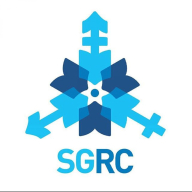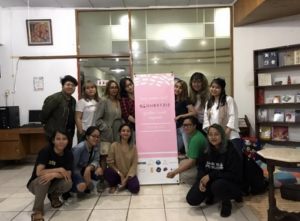Project
Combating Sexual Cyber Violence
-
Amount Funded
17,457 EUROProject Duration
12 Nov 2018 - 11 Nov 2019 -
-
Lead organisation
-
The Support Group and Resource Center and Sexuality Studies (SGRC) dreams of equal opportunities and justice for youth regardless of their gender identities. Their activities include 1. research (core), 2. information campaigns (publications and public discussions), and 3. support system with their peer counsellors.
This organisation was established by students from various major faculties in the University of Indonesia concerning lack of sexual education and information among youth. This was triggered by an event when a Trans friend was not allowed to attend the graduation ceremony because she was registered as male in the University of Indonesia. There was a protest to the university’s policy towards her. This led to discussions and a research related to gender and sexuality.
SGRC members are digital natives, easily adapting to new technologies and global issues. Their work focuses on locations in Jakarta and West Java. They have published more than a hundred articles, held several public discussions with at least had 200 attendees each, and one workshop. SGRC also works with their network and helped support the women march in Jakarta in 2017 and 2018.
SGRC is currently being hosted by the Indonesian Legal Aid Foundation, an initiative of Dr. Adnan Buyung Nasution, SH, supported by Jakarta’s Governor, Ali Sadikin. The establishment of the Legal Aid Institution (LBH) in Jakarta was followed by the establishment of regional LBH offices in Banda Aceh, Medan, Palembang, Padang, Bandar Lampung, Bandung, Semarang, Surabaya, Yogyakarta, Bali, Makassar, Manado and Papua.
-
Organisation
The Support Group and Resource Center and Sexuality Studies (SGRC) dreams of equal opportunities and justice for youth regardless of their gender identities. Their activities include 1. research (core), 2. information campaigns (publications and public discussions), and 3. support system with their peer counsellors.
This organisation was established by students from various major faculties in the University of Indonesia concerning lack of sexual education and information among youth. This was triggered by an event when a Trans friend was not allowed to attend the graduation ceremony because she was registered as male in the University of Indonesia. There was a protest to the university’s policy towards her. This led to discussions and a research related to gender and sexuality.
SGRC members are digital natives, easily adapting to new technologies and global issues. Their work focuses on locations in Jakarta and West Java. They have published more than a hundred articles, held several public discussions with at least had 200 attendees each, and one workshop. SGRC also works with their network and helped support the women march in Jakarta in 2017 and 2018.
SGRC is currently being hosted by the Indonesian Legal Aid Foundation, an initiative of Dr. Adnan Buyung Nasution, SH, supported by Jakarta’s Governor, Ali Sadikin. The establishment of the Legal Aid Institution (LBH) in Jakarta was followed by the establishment of regional LBH offices in Banda Aceh, Medan, Palembang, Padang, Bandar Lampung, Bandung, Semarang, Surabaya, Yogyakarta, Bali, Makassar, Manado and Papua.
-
Project
The Combating Sexual Cyber Violence project tackles the violence that is faced by youth online. This is done through having a support and peer counselling group that helps them in solving the problem and fighting back. Support Group and Resource Center and Sexuality Studies (SGRC) does this through raising awareness, training and counselling of the youth in their use of digital spaces. The project has created a system to help cyber violence survivors to recover and fight back.
The project reaches out to survivors from and by social media. Some survivors also contact SGRC via email and report their experiences for assessment. A peer counsellor is then sent for support. Potential counsellors are located in Jakarta and West Java with support group meetings held every two weeks. SGRC has a target of 35 youth counsellors ranging from 15-25 years old from diverse backgrounds. The project has 3 phases over a 12-month period:
1)Training and capacity building for the peer counselling team by sharing cases, knowledge, and information on sexual cyber violence;
2)Piloting of the Support Group as well as training and mentoring for community building;
3)Assessing the project for reporting. The project is also developing a new training module focused on how to make a support group system with the youth as experts on cyber sexual violence. The project ensures that young people understand how they can manage and survive sexual cyber violence.
-
-
The Combating Sexual Cyber Violence project tackles the violence that is faced by youth online. This is done through having a support and peer counselling group that helps them in solving the problem and fighting back. Support Group and Resource Center and Sexuality Studies (SGRC) does this through raising awareness, training and counselling of the youth in their use of digital spaces. The project has created a system to help cyber violence survivors to recover and fight back.
The project reaches out to survivors from and by social media. Some survivors also contact SGRC via email and report their experiences for assessment. A peer counsellor is then sent for support. Potential counsellors are located in Jakarta and West Java with support group meetings held every two weeks. SGRC has a target of 35 youth counsellors ranging from 15-25 years old from diverse backgrounds. The project has 3 phases over a 12-month period:
1)Training and capacity building for the peer counselling team by sharing cases, knowledge, and information on sexual cyber violence;
2)Piloting of the Support Group as well as training and mentoring for community building;
3)Assessing the project for reporting. The project is also developing a new training module focused on how to make a support group system with the youth as experts on cyber sexual violence. The project ensures that young people understand how they can manage and survive sexual cyber violence.
-
A space for sisterhood has been created, named SPACE UNJ and SGRC in Jakarta, Sweat and Psycho in Karawang, Pad GHRS in Bandung, Dipo GHRC in Semarang, Distraksi UGM and Lavender Study Club in Yogyakarta, KGSK Ubaya in Surabaya, and GSHR Udayana in Bali to establish the 9 (nine) networks of campus-based young people. From these small communities we developed SOP together, especially on Gender Based Violence Online. We have built the formation of the peer counselors which are varied in terms of gender identity and sexual orientation: dominated by female (8) and male (5) and non-binary (2). This suits SGRC’s mission statement that strives to provide a safe environment for all members of the community related to gender identity and sexual orientation issues. Successfully formed the referral system of the Sexual Reproductive Health and Rights access to each of IPPA’s (Indonesian Planned Parenthood Association) in all regions in Indonesia.





